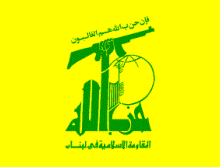 Mexico has arrested Jameel Nasr, a Mexican national, Tijuana resident and graphic designer accused of trying to set up a South American Hezbollah network. Jameel reportedly traveled frequently to Lebanon to receive instructions from Hezbollah. He also traveled extensively around South America, including two months in 2008 in Hugo Chavez’s Venezuelan workers’ paradise.
Mexico has arrested Jameel Nasr, a Mexican national, Tijuana resident and graphic designer accused of trying to set up a South American Hezbollah network. Jameel reportedly traveled frequently to Lebanon to receive instructions from Hezbollah. He also traveled extensively around South America, including two months in 2008 in Hugo Chavez’s Venezuelan workers’ paradise.
There are a significant number of Shia Muslims in South America, many of them with family connections in Lebanon. It is this Lebanese community in South America that was targeted as potential local Hezbollah agents.
Hezbollah has made common cause with the drug cartels: In exchange for lending its tunnel-building prowess, Hezbollah gets a share of the drug-smuggling profits. In recent Congressional testimony, assistant administrator for intelligence at the Drug Enforcement Administration Anthony Placido said: “There are numerous reports of cocaine proceeds entering the coffers of Islamic Radical Groups such as Hezbollah and Hamas.”
Further, in 2009 Admiral James Stavridis testified before the Senate Armed Services Committee about Hezbollah’s drug-related activities in Colombia: “We have seen . . . an increase in a wide level of activity by the Iranian government in this region. That is a concern principally because of the connections between the government of Iran, which is a state sponsor of terrorism, and Hezbollah.”
And former assistant administrator and chief of operations at the U.S. Drug Enforcement Administration Michael Braun says that Hezbollah uses “the same criminal weapons smugglers, document traffickers and transportation experts as the drug cartels. They work together. They rely on the same shadow facilitators. One way or another, they are all connected.”
Islamist terrorists in South America is not a new problem. MSNBC reported over three years ago:
The Iranian-backed Hezbollah militia has taken root in South America, fostering a well-financed force of Islamist radicals boiling with hatred for the United States and ready to die to prove it, according to militia members, U.S. officials and police agencies across the continent.
From its Western base in a remote region divided by the borders of Paraguay, Brazil and Argentina known as the Tri-border, or the Triple Frontier, Hezbollah has mined the frustrations of many Muslims among about 25,000 Arab residents whose families immigrated mainly from Lebanon in two waves, after the 1948 Arab-Israeli war and after the 1985 Lebanese civil war.
What may be new is Hezbollah’s coming to sit on the doorstep of the United States. But it was foreseeable. As long ago as 2004 the CIA Counter Terrorism Center warned: “Many alien smuggling networks that facilitate the movement of non-Mexicans have established links to Muslim communities in Mexico. Non-Mexicans often are more difficult to intercept because they typically pay high-end smugglers a large sum of money to efficiently assist them across the border, rather than haphazardly traverse it on their own.”
And in fact there are documented instances of Hezbollah-niks sneaking into the United States:
· In 2001, Mahmoud Youssef Kourani drove from Mexico to Dearborn, Michigan. He was later convicted of providing material support to Hezbollah.
. In 2009 Mexico convicted Salim Boughader Mucharrafille of smuggling 200 people, including Hezbollah supporters, into the U.S.
Thus, any claim that, as far as we know, there are no Hezbollah terrorist cells in the U.S. has to be properly understood. It is a statement about our ignorance. Based on what we do actually know, though, it would be foolish to discount the possibility.
One consequence of this possibility is to recognize that if there were military action against Iranian nuclear facilities, there could be significant terrorist reprisals in the U.S. It is possible that the plans and infrastructure for such attacks are already in place. Or if not in place today, Hezbollah and other Iranian agents are probably trying to create them.
So the demand to “secure our borders” (north and south—there are Islamists in Canada, too) is not simply a racist reflex. The demand to stop illegal immigration even before dealing with other aspects of the problem is not irrational. It is not illiberal. There is a genuine, urgent issue of national security at stake.
By: Paul Kujawsky

Leave a Reply
You must be logged in to post a comment.